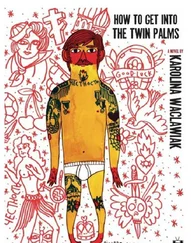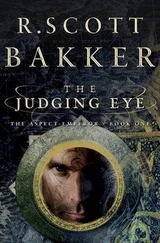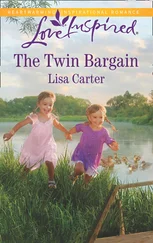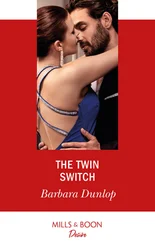She gives me a baffled look.
“Jarno Koper? Is he gone yet?”
“Oh, Jarno Koper. Yes, he left.”
I walk her through the scullery.
“She must have loved your brother very deeply,” Ada says as she opens the door to the milking parlor.
“To call her son Henk?”
“Yes.”
“It’s a common enough name.”
“Bye, Helmer. Say hello to your father for me, will you?”
“I will.”
I watch her walk past the storage tank and out of the milking parlor. There’s something elderly about the way she holds her back, something I’ve never noticed before.
The first thing I do when I go into Father’s bedroom is say hello from Ada. Then I give him the works. I sit him down on the toilet and ask whether he wants to shave before or after his shower. Before, he says, and he wants to do it himself. I take the small mirror off the wall in the hall and put it on the sink so that he can see himself while sitting on the plastic stool. It takes forever: his hands tremble and he finds it difficult to pull the folds in his neck smooth and use the razor at the same time. Besides washing his body, I also squirt a big dollop of shampoo into his hair. Once he’s clean, I ask him whether he can stay sitting on the stool. He can, as long as he clamps his hands on his knees and leans back against the tiled wall. I go upstairs, strip the bed and remake it with clean sheets and pillowcases. I catch myself whistling while I’m at it. Before going downstairs again, I walk to the window and look at the hooded crow. “Yes, have a good look,” I say, when I see its eye on me. A little later Father is back in bed with fresh-smelling, combed hair.
“I want some French toast,” he says.
“Do you turn over in bed sometimes?”
“Turn over? Why should I?”
“If you always lie on your back like that, you’ll get bedsores and then you’ll have to go to hospital, and, once you’re there, that’ll be it, there’ll be no coming back.”
“Yeah?”
“Yes.”
“In Purmerend?”
“What in Purmerend?”
“The hospital.”
“If you like.”
“Nonsense,” he says, closing his eyes.
But just before I shut the door I hear the fresh sheets rustling.
Strange, my making such a fuss about being the last Van Wonderen. Without a wife, without kids and with a decrepit father who’s never wasted a word on family in my presence, I never expected myself to get sentimental about my own flesh and blood. Is it the farm? Our farm? A collection of buildings, animals and land I didn’t want anything to do with, an entity that was forced on me, but gradually became part of me?
Next to the donkey paddock there used to be a cottage that was going to be Henk and Riet’s home after their wedding. First the farmhand had to go, then later Henk and Riet would have children, starting a family that would outgrow the cottage and end up moving into the farmhouse. Everything had been planned in advance: in her mind Mother had already furnished the cottage. After the farmhand left they rented it out to Amsterdammers, who only came for holidays and weekends. When I turned thirty, Father decided to sell it. Mother disagreed. “You never know,” she said, with a sidelong glance in my direction. On a Sunday night in the autumn of 1987 after the Amsterdammers had been there for the weekend it burned down, about eight months before Mother died. It’s still strange to see the gnarled magnolia flower every spring in the totally overgrown garden. One of the side walls is still half standing, but that won’t last long either.
The Forestry Commission wants to buy the land.
I regret throwing my bed on the New Year’s bonfire. “Another bed?” the jovial shop assistant asked yesterday when I went in for a cheap pine bed. “Yes,” I said, “another bed.” Did I want a mattress to go with it? No, I didn’t need a mattress. In the other shop I wasn’t served by the young girl with the black braids, but by an older, weary looking woman. I bought a single duvet, two duvet covers and two white fitted sheets, all in a sale. I paid no attention to the colors or patterns. Satisfied with my purchases, I bought a pound of eel at the smokehouse. I poked the long sides of the bed out of the front passenger and rear left windows and tried to get home at an even speed, without accelerating or braking hard.
Before setting to work, I open the window and spread newspapers over the blue carpet. I have brought the transistor radio upstairs from the kitchen. It’s nice to paint with the radio on. When I’m painting outside in the summer, I always have Radio Tour de France on. I don’t care who wins or loses, it’s the commentary that matters. I start with the ceiling. It was already white so one coat is enough. The wallpaper on the walls is patterned, a sixties pattern. A tanker has turned over near Reeuwijk, four men in yellow suits are cleaning up the slaked lime. People living in the immediate vicinity are advised to keep all windows and doors shut. The paint dries quickly and as it dries the pattern grows fainter and fainter. I was only planning on doing the walls and ceiling but, now I’ve started, the varnished wooden frame of the window annoys me. Thom de Graaf of Democrats ‘66 explains the benefits of direct prime-ministerial elections. “Will they give us a prime minister with a cute bum?” the reporter asks. The question doesn’t faze De Graaf. “The only people who ever talk about cute bums are journalists,” he says. I look at the radio, unable to believe I’m hearing what I’m hearing. The door is white gloss. When I’ve finished the first coat, I walk to the barn to get the bluish-gray primer from the poison cabinet. Lifting the tin, I can tell that there is enough left to paint the door and window. I take the primer, a sheet of sandpaper and a brush back upstairs and sand the woodwork very carefully. The paint is still wet. Indonesians may not have a word for ice-skating, but at a shopping mall in Jakarta people are skating on an ice rink. There are no signs of an economic crisis in Indonesia, but the population has still had enough of President Megawati. When I’ve finished the primer, I do another coat of white on the walls. The pattern re-emerges under the roller. I’ll have to check tonight to make sure the second layer has really covered it. At the moment there are scattered showers across the country. Later, rain will move in from the west. Tomorrow will be overcast, clearing slightly in the course of the day.
I turn the light on in Henk’s bedroom and shift some old junk out of the way to get at the bedside cabinet. I pick it up and carry it through to the new room, where I give it a lick of primer as well. Then I look in on Father.
He sniffs. “You painting?”
“Yep.”
“What this time?”
“The new room.”
“Why?”
“For the farmhand.”
“The farmhand?”
“Yep. Didn’t I tell you?”
“I just lie here, no one tells me anything.”
“I did tell you, you’ve forgotten.”
“I never forget anything.”
“Have it your own way. I bought some eel, would you like a bit later?”
“Delicious,” he says, grinning. It’s still unbearable, but not as bad as usual.
In the evening I spend a long time in the shower. I want to be wet: warm and wet. I don’t even want to think about drying myself off. The walls of the new room are finished, the sixties pattern has disappeared completely. Tomorrow morning: the Velux window, the door and the bedside cabinet. Tomorrow evening I’ll assemble the bed, chuck my old mattress on top and put the bedside cabinet next to it. When I see that my fingertips have started shriveling, I turn off the taps. I dry myself quickly and hurry through the scullery. I comb my hair in front of the big mirror above the mantelpiece. The warmth from the fire glows on my legs and lower belly. I turn the knob down from 4 to 1 and walk over to my bedroom door.
Читать дальше












